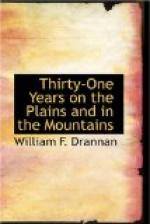We traveled up the Arkansas river to the mouth of the Purgatoire— pronounced in that country Picket Wire—which was about thirty miles from Bent’s Fort. Seeing a small band of buffalo some distance away, we took the pack-saddles off of the mules and turned them out to graze, mounted our saddle-horses and were off for the herd; but the wily beasts got wind of us and started off before we got within gunshot of them. After running them about a mile we overhauled them, both fired and each killed a yearling calf while on the run. I fastened my rifle to the pommel of the saddle, drew my pistol, and there being a very fine heifer that had dropped back to the rear, I spurred up by the side of her and was just in the act of firing, when old Croppy stepped into a prairie-dog hole and fell with me.
Johnnie West had just fired his second shot and killed a fine three-year-old heifer, when he looked and saw old Croppy lying there, and I stretched out beside him, apparently dead. The first thing I knew after the fall, Johnnie West was sitting by my side slapping me in the face with his hand.
I was badly bruised but no bones were broken, and as soon as I recovered sufficiently to know for a certainty that I was not dead, an examination of old Croppy developed the fact that his left shoulder was badly broken. I being too chicken-hearted to shoot him, got Johnnie West to put him out of his misery, and now I was left afoot and thirty miles from home. Johnnie West went back and got our pack-mules. We dressed our buffalo and had plenty of meat to load all of our mules, and some to leave there for the hungry cayotes. That night while we were cooking some of the meat for supper, the cayotes raised a howl and it seemed as though they would take possession of our camp in spite of us; but by firing a shot among them once in a while, we were able to keep them at bay.
In those days hunters never took along anything to eat, for a man that could not kill what he could eat was considered worthless.
The following morning we loaded our meat on the mules, lashed my saddle on top of one of the packs and started for Bent’s Fort. I being bruised and crippled up from the effects of my fall, Johnnie let me ride his horse and he walked almost the entire way home.
Mr. Roubidoux on learning that I had left old Croppy dead on the prairie, said: “I have got the best buffalo horse on the plains, and I will make you a present of him;” and turning to his herder, he said, “go and bring Pinto in.”
When the spotted horse was brought in, Mr. Roubidoux said: “Now, Will, I am going to make you a present of this horse, and I want you to keep him to remember me by.”
I thought this the prettiest horse I had ever laid eyes on, and he proved to be as good a buffalo horse as Mr. Roubidoux had represented him to be.
On the third day of July, Johnnie West and I having enough meat ahead to last several days, we pulled out for Taos to attend the wedding of Kit Carson. Arriving there, Uncle Kit took us to his house.




